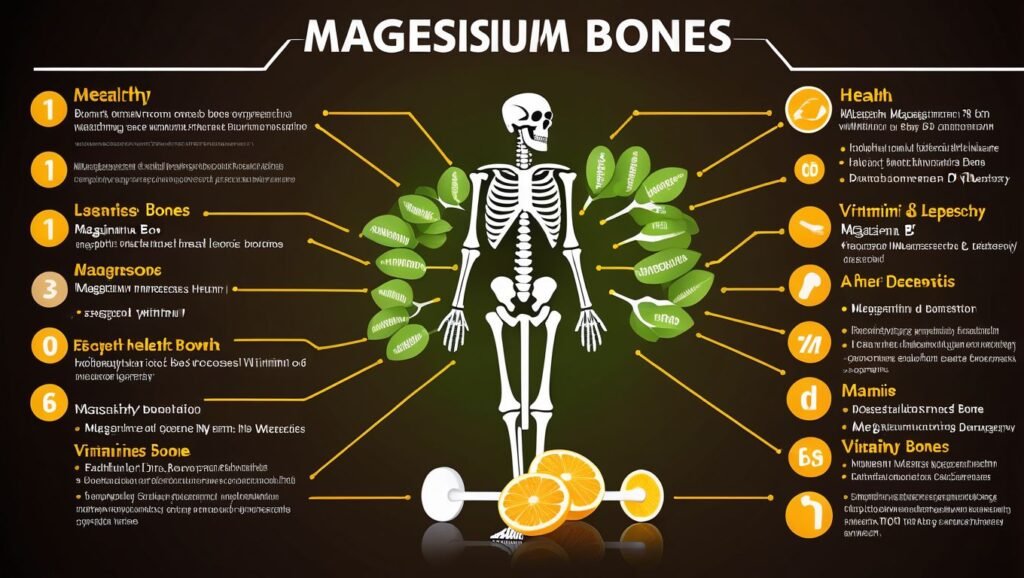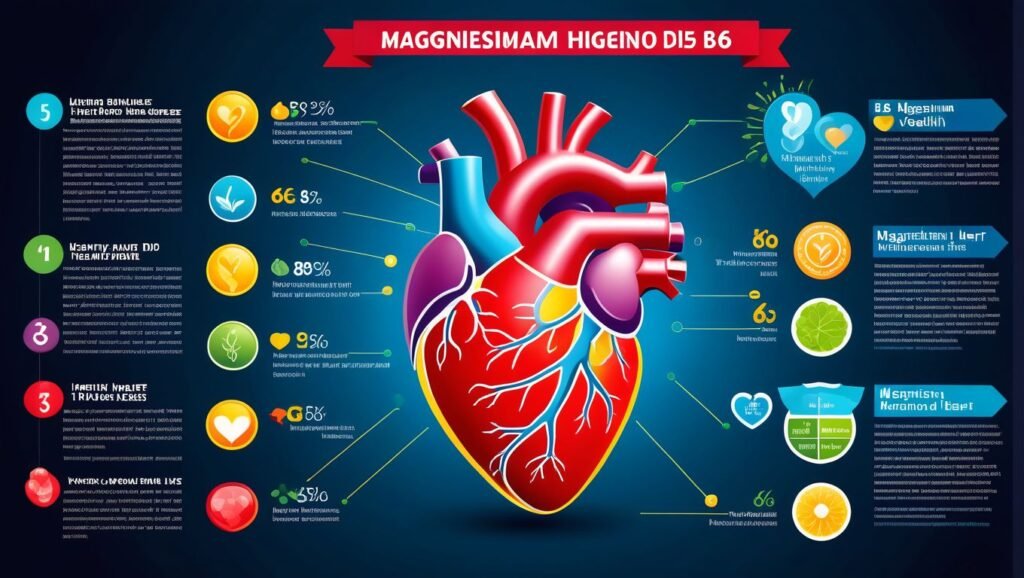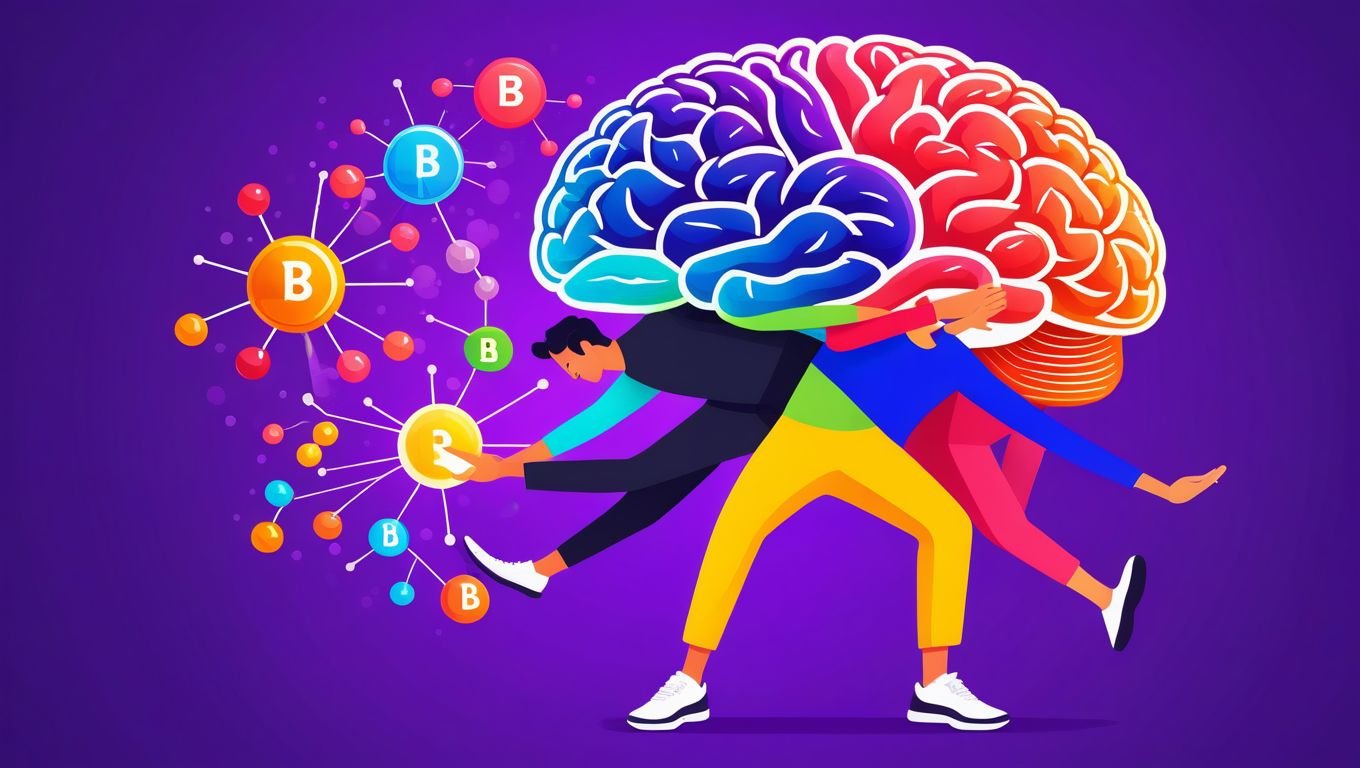“10 Amazing Ways Magnesium + Vitamins Improve Health”
Magnesium + Vitamins: Discover 10 amazing ways this powerful combination boosts immune support, bone health, heart health, and more!

10 Amazing Ways Magnesium + Vitamins Improve Health
Introduction
Magnesium, Vitamin D, and Vitamin B6 are fundamental to maintaining optimal health and ensuring the proper functioning of various bodily systems. Magnesium is a key mineral that supports numerous enzymatic reactions and plays a role in muscle, nerve, and immune functions. Vitamin D, often referred to as the “sunshine vitamin,” is critical for calcium absorption, immune regulation, and bone strength. Meanwhile, Vitamin B6, a water-soluble vitamin, aids in protein metabolism, neurotransmitter synthesis, and red blood cell production.
When combined, these nutrients create a synergistic effect that amplifies their individual benefits. Magnesium supports the activation of Vitamin D, Vitamin B6 enhances magnesium’s effectiveness in enzymatic processes, and together they provide a comprehensive boost to immunity, bone health, and more.

Benefit 1: Immune Support
The immune system protects the body from infections and illnesses, and these three nutrients play a critical role in maintaining its strength and efficiency:
- Magnesium’s Role: Magnesium is essential for the proper function of immune cells, including T-cells and natural killer cells. It also regulates inflammatory processes, which are critical for a balanced immune response.
- Vitamin D’s Role: Vitamin D enhances immune function by activating T-cells and boosting the production of antimicrobial peptides that target harmful bacteria and viruses. It also plays a role in modulating the immune system to prevent overreaction, reducing the risk of autoimmune disorders.
- Vitamin B6’s Role: Vitamin B6 contributes to the production of white blood cells and cytokines, which are necessary for detecting and neutralizing pathogens. It also helps regulate immune responses, ensuring the body reacts appropriately to threats.
Their Combination Enhances Immune Function
When magnesium, vitamin D, and vitamin B6 are consumed together, they work synergistically to bolster the immune system. Magnesium activates enzymes that facilitate vitamin D metabolism, increasing its availability to support immune health. Simultaneously, Vitamin B6 ensures that the immune cells function efficiently by maintaining proper protein and neurotransmitter levels. This combination not only strengthens the body’s defenses but also helps in faster recovery from illnesses.

Benefit 2: Bone Health
Bone health is vital for mobility, strength, and overall quality of life. Magnesium, Vitamin D, and Vitamin B6 each play integral roles in maintaining bone density and strength.
- Magnesium’s Role in Bone Health: Magnesium is critical for bone structure as approximately 60% of the body’s magnesium is stored in the bones. It works alongside calcium to maintain bone density and supports the enzymes responsible for bone remodeling and repair.
- Vitamin D’s Role in Bone Health: Vitamin D facilitates the absorption of calcium and phosphorus from the digestive tract, ensuring these minerals are available for bone formation. It also regulates calcium levels in the blood, ensuring optimal deposition in bones and reducing the risk of osteoporosis.
- Vitamin B6’s Role in Bone Health: Vitamin B6 plays a less direct but equally important role by regulating homocysteine levels. High homocysteine can weaken bones and increase the risk of fractures. Vitamin B6 supports the synthesis of collagen, a protein that provides a framework for bone strength.
How Their Combination Supports Bone Density and Strength
The combined effects of magnesium, vitamin D, and vitamin B6 create a robust foundation for bone health. Magnesium enhances vitamin D activation, ensuring that calcium absorption is maximized. Together, magnesium and vitamin D ensure calcium is directed to the bones rather than accumulating in soft tissues. Vitamin B6 complements this by protecting against bone loss caused by elevated homocysteine levels.
This powerful trio helps maintain strong and healthy bones, reduces the risk of osteoporosis and fractures, and promotes better skeletal support throughout life.
Benefit 3: Heart Health
A healthy heart is critical for overall well-being, and magnesium, vitamin D, and vitamin B6 contribute significantly to cardiovascular health.
- Magnesium’s Role: Magnesium supports normal heart rhythms by maintaining the balance of electrolytes like potassium and calcium in heart cells. It also helps relax blood vessels, reducing blood pressure.
- Vitamin D’s Role: Vitamin D regulates blood pressure by influencing renin, a hormone that controls vascular tension. It also reduces the risk of arterial calcification, which can lead to heart disease.
- Vitamin B6’s Role: Vitamin B6 lowers homocysteine levels in the blood. Elevated homocysteine is associated with an increased risk of heart disease.
How Their Combination Reduces Heart Disease Risk
Magnesium and Vitamin D work together to improve vascular health and regulate blood pressure, while Vitamin B6 reduces harmful factors like homocysteine. Together, they create a protective barrier against cardiovascular diseases, including hypertension, atherosclerosis, and heart attacks.
Benefit 4: Cognitive Function
Brain health and cognitive function are vital for quality of life, and magnesium, vitamin D, and vitamin B6 are key contributors.
- Magnesium’s Role: Magnesium is involved in synaptic plasticity, which is essential for learning and memory. It also helps manage stress by regulating neurotransmitters.
- Vitamin D’s Role: Vitamin D supports brain function by reducing inflammation and protecting neurons. It also helps regulate mood and prevent cognitive decline.
- Vitamin B6’s Role: Vitamin B6 is crucial for synthesizing neurotransmitters like serotonin and dopamine, which influence mood, memory, and mental clarity.
Benefits for Memory, Mental Clarity, and Cognitive Function
The synergy between these nutrients enhances mental clarity, supports memory retention, and reduces the risk of cognitive decline. Regular intake can help maintain focus, improve problem-solving skills, and combat age-related mental decline.
Benefit 5: Energy Metabolism
Energy production is essential for daily activities, and magnesium, vitamin D, and vitamin B6 each play a vital role.
- Vitamin B6’s Role: Vitamin B6 is pivotal in breaking down proteins, carbohydrates, and fats into energy. It also supports hemoglobin production, ensuring oxygen transport to tissues.
- Magnesium’s Role: Magnesium is required for ATP (the body’s energy currency) production, enabling cells to generate and utilize energy efficiently.
- Vitamin D’s Role: Vitamin D helps combat fatigue by promoting calcium and phosphate metabolism, both essential for muscle function and energy levels.
How Their Combination Supports Energy Levels
Together, these nutrients optimize energy production, ensure efficient oxygen delivery, and reduce fatigue. This makes them essential for maintaining vitality throughout the day.
Benefit 6: Anti-Inflammatory Effects
Chronic inflammation is linked to numerous diseases, but magnesium, vitamin D, and vitamin B6 have notable anti-inflammatory properties:
- Magnesium’s Role: Magnesium reduces inflammation by lowering markers like C-reactive protein (CRP).
- Vitamin D’s Role: Vitamin D modulates the immune system to reduce inflammatory responses and prevent autoimmune conditions.
- Vitamin B6’s Role: Vitamin B6 helps regulate pro-inflammatory cytokines, reducing overall inflammation in the body.
How Their Combination Helps Manage Chronic Conditions
The anti-inflammatory effects of this trio alleviate symptoms of chronic inflammatory conditions like arthritis, metabolic syndrome, and cardiovascular disease. They work together to balance the immune system, lower inflammation markers, and promote overall health.
Benefit 7: Muscle Function
Muscle health is essential for movement, strength, and physical performance. Magnesium, Vitamin D, and Vitamin B6 play integral roles in maintaining and improving muscle function.
- Magnesium’s Role: Magnesium is vital for muscle contraction and relaxation. It ensures proper electrolyte balance, reducing the likelihood of muscle cramps and spasms.
- Vitamin D’s Role: Vitamin D supports muscle strength by promoting calcium absorption and maintaining calcium balance in muscle tissue. It is particularly important for preventing muscle weakness.
- Vitamin B6’s Role: Vitamin B6 aids in protein metabolism, which is crucial for muscle repair and growth. It also helps regulate neurotransmitters involved in muscle control.
How Their Combination Supports Muscle Function and Reduces Cramps
The combination of magnesium and vitamin D ensures that muscles contract and relax efficiently, minimizing the risk of painful cramps or spasms. Vitamin B6 complements this by aiding in protein synthesis and recovery after physical activity. This trio not only supports daily muscle function but also improves athletic performance and helps prevent age-related muscle loss.
Benefit 8: Mood Regulation
Maintaining a stable and positive mood is essential for mental health, and magnesium, vitamin D, and vitamin B6 are key players in mood regulation.
- Magnesium’s Role: Magnesium is involved in the regulation of neurotransmitters that influence mood, such as serotonin and dopamine. It also helps manage stress by reducing cortisol levels. Magnesium deficiency is often linked to an increased risk of depression and anxiety.
- Vitamin D’s Role: Vitamin D is associated with the production of serotonin, a “feel-good” neurotransmitter that enhances mood. Low levels of vitamin D are correlated with seasonal affective disorder (SAD) and other forms of depression.
- Vitamin B6’s Role: Vitamin B6 plays a crucial role in the synthesis of neurotransmitters like serotonin and GABA, which help regulate mood and reduce anxiety.
How Their Combination Helps Reduce Symptoms of Depression and Anxiety
Together, magnesium, Vitamin D, and Vitamin B6 form a powerful trio to combat mood disorders. Magnesium supports neurotransmitter regulation, Vitamin D boosts serotonin production, and Vitamin B6 facilitates the synthesis of mood-stabilizing hormones. This synergy reduces symptoms of depression and anxiety, helping maintain emotional balance and mental clarity.
Benefit 9: Skin Health
Healthy skin is a reflection of overall wellness, and magnesium, vitamin D, and vitamin B6 are vital for maintaining vibrant and youthful skin.
- Magnesium’s Role: Magnesium helps regulate skin’s pH balance, preventing excessive dryness or oiliness. It also reduces inflammation, which can lead to acne and other skin conditions.
- Vitamin D’s Role: Vitamin D promotes skin cell regeneration and repair, helping to maintain a smooth and even texture. Its antiinflammatory properties also help manage conditions like psoriasis and eczema.
- Vitamin B6’s Role: Vitamin B6 aids in protein metabolism, which is crucial for collagen production. Collagen keeps the skin firm and elastic, reducing the appearance of wrinkles and fine lines.
r Combination Protects Against Skin Damage and Aging
The combination of these nutrients enhances skin health by addressing multiple factors simultaneously. Magnesium calms inflammation and supports hydration, Vitamin D encourages repair and regeneration, and Vitamin B6 boosts collagen production. Together, they protect the skin from environmental damage, delay signs of aging, and promote a healthy, radiant complexion.
Conclusion
Magnesium, Vitamin D, and Vitamin B6 are a dynamic trio that offer a wide range of health benefits. To recap, these nutrients contribute to:
- Immune Support::trengthening the body’s defense system.
- Bone Health::mproving bone density and strength.
- Heart Health::romoting cardiovascular wellness and reducing heart disease risk.
- Cognitive Function::nhancing memory, mental clarity, and overall brain health.
- EnergyMetabolism:– Boosting energy levels and combating fatigue.
- Anti-Inflammatory EEffects:Managing chronic inflammation and associated conditions.
- Muscle Function::upporting muscle strength and reducing cramps.
- Mood Regulation::lleviating symptoms of depression and anxiety.
- Skin Health::rotecting the skin against damage and signs of aging.
By incorporating these nutrients into your diet through food sources or supplements, you can significantly enhance your overall health and well-being. Prioritize foods like leafy greens, fatty fish, eggs, nuts, seeds, and fortified cereals to ensure you receive the full spectrum of benefits.
Take a proactive step towards a healthier life by making magnesium, vitamin D, and vitamin B6 an essential part of your daily routine. Your body and mind will thank you!
Read also: “28 Creative Ideas to Make Store-Bought Meals Shine!”




